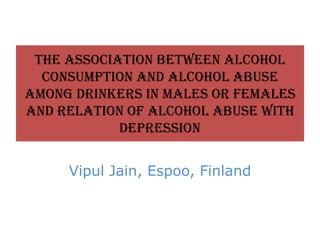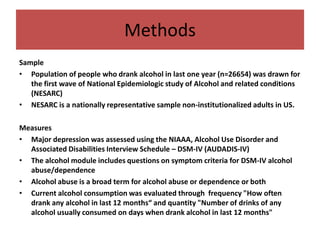Final project
- 1. The association between alcohol consumption and alcohol abuse among drinkers in males or females and relation of alcohol abuse with depression Vipul Jain, Espoo, Finland
- 2. Introduction While alcohol consumption is not considered out of place in society, alcohol abuse or addiction is still a concerning problem. Most studies have shown a correlation between alcohol consumption and alcohol related abuse, less is known of gender distribution of alcohol abuse. We need to ascertain if males or females are more likely to have alcohol addiction or related problems. Furthermore, greater alcohol consumption is more likely to cause psychiatric problems like depression. These psychiatric problems may have some association with alcohol abuse among drinkers.
- 3. Research Question • Is alcohol abuse associated with rate of alcohol consumption • Are people suffering from depression more likely to suffer from alcohol abuse • Is the association between drinking and alcohol abuse similar for both males and females
- 4. Methods Sample • Population of people who drank alcohol in last one year (n=26654) was drawn for the first wave of National Epidemiologic study of Alcohol and related conditions (NESARC) • NESARC is a nationally representative sample non-institutionalized adults in US. Measures • Major depression was assessed using the NIAAA, Alcohol Use Disorder and Associated Disabilities Interview Schedule – DSM-IV (AUDADIS-IV) • The alcohol module includes questions on symptom criteria for DSM-IV alcohol abuse/dependence • Alcohol abuse is a broad term for alcohol abuse or dependence or both • Current alcohol consumption was evaluated through frequency "How often drank any alcohol in last 12 months“ and quantity "Number of drinks of any alcohol usually consumed on days when drank alcohol in last 12 months"
- 5. Results Univariate • Yearly, drinkers drank an average of 1651 drinks (s.d 5049) • 12.3% of drinkers met the criteria for DSM-IV alcohol abuse/dependence in the past year • A total of 20% met the criteria for major depression at some point in their life Bivariate • People suffering from depression are more likely to suffer from alcohol abuse if the drinkers come within the same drinking category. • Drinkers it seems, male or female were equally likely to be drinking much heavily if suffering from alcohol abuse than not. P<0.0001 for both males and females shows that for both alcohol abuse is related to heavier alcohol consumption. Male (261, 963) and Female (117,603) (mean drinks/yr)(No alc. Abuse, alc. Abuse)
- 6. GRAPH: Number of Drinks consumed and alcohol abuse by major depression among drinkers
- 7. GRAPH: ANOVA Moderation association between alcohol abuse and amount of consumption of drinks by gender
- 8. Discussion What might the results mean? • Alcohol abuse seems to be strongly associated with alcohol consumption among drinkers • Individuals with major depression seem to be more sensitive to alcohol abuse for each drinking category • Association between alcohol abuse and consumption holds for both males and females. Strengths • Results are based on a large nationally representative sample of U.S. drinkers Limitations • The present findings are based on cross-sectional data and do not reflect the alcohol consumption levels at which alcohol abuse emerges among the drinkers with or without depression Recommended Future research • Further research is needed to determine whether sensitivity to alcohol abuse or addiction may be based on physical and/or psychological differences related to major depression
- 9. Actual program that provided the result and output of the analysis









